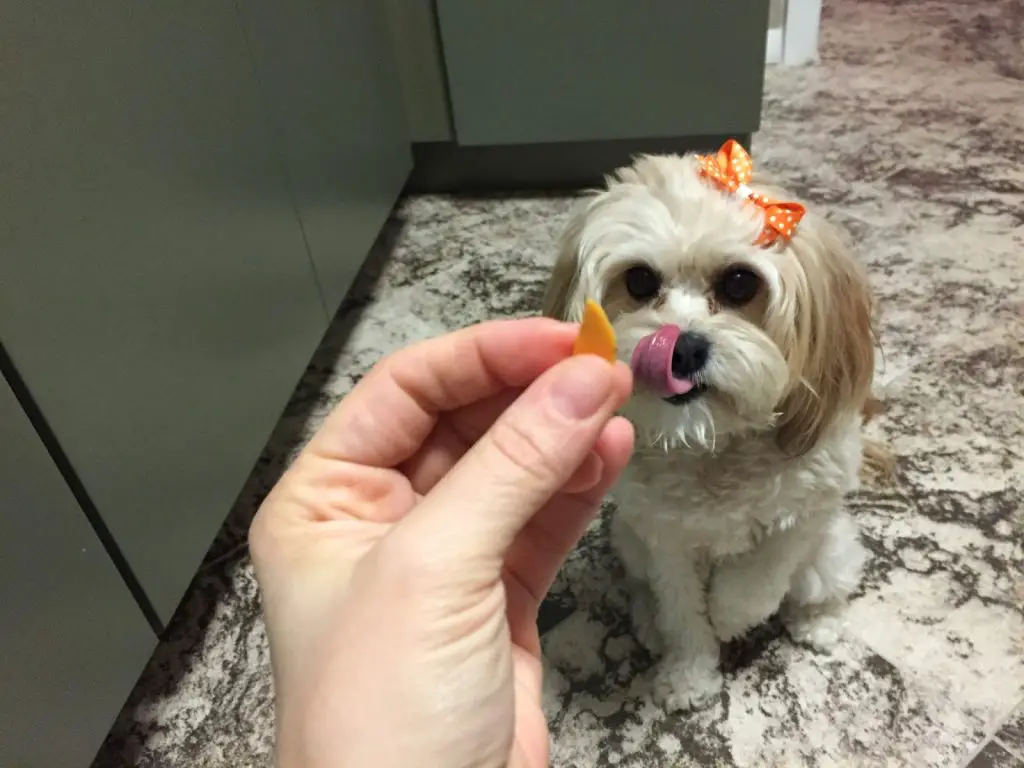Can Dogs Eat Provolone Cheese?
Dairy snacks are considered the healthiest variety of snacks in humans, but can your pets consume dairy products too?
If you research there are several dairy snacks available for pets like this one, but some veterinarian advises to avoid giving dairy products to the dogs. This is because:
- Some dogs lack enzymes such as lactase in their gut that are vital for the breakdown and digestion of lactose present in the dairy products
- Dogs that lacks lactase may develop indigestion or upset stomach if they consume dairy products
Should you consider cheese as a snack for your dog?
Imagine you are enjoying your favorite cheese with crackers and your dog comes by; would you share your snack with your furry baby? Or what about that leftover pizza slice, is it safe to share some with your best furry friend?
A lot of pet owners go through this dilemma of whether the wholesome, innocent and nutritious cheese can make a good snack for dogs or not?
It has been observed that cheese is generally a well-tolerated snack in most dogs as the quantity of lactose present in some cheese varieties is extremely low when compared to traditional dairy products such as milk. This eliminates the problem of lactase deficiency.
However, there are some other factors that must be considered:
- Cheese is a high calorie snack (Check all cheese calories here). 1 oz or 1 slice of cheese supplies 98 calories, which is a lot of calories for any dog snack.
- 70% of the calories in the cheese are contributed by fats (most of which is saturated).
- Avoid giving cheese with some medications (such as Doxycycline) as it may affect the drug absorption.
Therefore, if you choose to give cheese as a snack to your dog, make sure it is an occasional indulgence served in small quantities.
Not sure about yours, but my dog absolutely go crazy to this one.
Is Provolone suitable for dogs?
Provolone cheese is a low carbohydrate cheese – i.e. 1 oz. of provolone cheese contains only 0.5 grams of sugars. In addition, as part of the processing, lactose in provolone cheese breaks down to yield glucose and galactose; and for that reason, provolone is generally well-tolerated in dogs.
To be safe, veterinarians recommend testing the safety and tolerance of provolone cheese (or other dairy products) in your dog with a small test dose and then closely monitoring to watch for any adverse effects. Other helpful tips to consider are:
- Use low-fat provolone cheese option for your dogs
- Make home-made treats with provolone cheese instead of considering processed options available in the market.
- Buy lactose- free provolone cheese
While choosing provolone as a snack for your dog, opt for hard chew treats. Because of pungent smell of cheese, dogs love to munch these on. Also, compared to soft treats, hard chew snacks lasts longer and keep your pup satisfied for a longer period of time.
However, avoid giving provolone cheese as a snack to your dog if:
- Your dog has a known allergy to dairy products
- If your dog ever had a bad reaction to milk or dairy products in the past
Is there a safe dose or quantity of provolone cheese for dogs?
Ideally, dogs thrive if they are fed a low sodium, low fat diet. When choose provolone cheese snacks for your dog, looks for options that are low in calories, are fat-free and low in sodium content. In terms of dosage, do not give more than one to two cubes that too very occasionally.
It is recommended that a dog treat should not contain more than 10% of the dog’s recommended daily calorie intake. For a dog that weighs around 35 pounds, this amounts to 35 calories which would make very small serving size of cheese. Fortunately, low fat provolone cheese options are low in calories (1oz = 45 calories).
If consumed in high or frequent doses, the saturated fat in cheeses are can lead to pancreatitis that may prove life-threatening or can lead to obesity (also for human, read more).

What other kinds of cheese are good for dog?
Besides provolone cheese, other varieties that are well-tolerated in dogs include cottage cheese because not only it is high in proteins, it also has the lowest concentration of fats. Other relatively harmless varieties of cheese that are generally tolerated well with many dogs because of lower lactose content are:
- Cheddar cheese
- Parmesan
- Pepper jack
- Swiss cheese
- Any other cheese that is lactose free
Some of these cheeses are used by pet owners to slip pills (especially if the dog does not take the pill from any direct source).
What may happen if you give cheese to a lactose -intolerant dog?
If your lactose intolerant dog consumes cheese by mistake, it may lead to:
- Profuse diarrhea
- Projectile vomiting
- Possible dehydration
- Nasty and foul-smelling farts
What types of cheeses to avoid absolutely?
Any cheese variety or spread that has toxic ingredients such as avocadoes, onion and garlic should be absolutely avoided. Likewise, cream cheese is also a bad choice for pet snack because of presence of additives and preservatives that may cause an adverse reaction in dogs.
In addition, avoid following cheese varieties as well:
- String cheese (a traditional stick has about 90 calories which is too much for a small dog for just snacking)
- Havarti cheese (presence of additives as well as harmful ingredients such as onion & garlic)
- Cottage cheese (higher lactose content)
- Blue cheeses (such as Roquefort, Stilton) or any other ripen cheese produces harmful toxins like roquefortine that may prove fatal for dogs.
- Feta & Brie cheese (higher lactose & fat content)
- Herb cheeses
Watch out for following signs. If your dog has consumed cheese and is now presenting following symptoms; take him to a vet as soon as possible.
- Shivering or shaking
- Watery diarrhea
- Lethargy or weakness
- Violent involuntary movements or spasms
- Profuse vomiting
- Lethargy or weakness
- Symptoms of neurological upset such as agitation, aggression, confusion, etc.)
Otherwise, it’s always nice to make your provolone at home, it’s easy!
References:
- Griebsch, C., Whitney, J., Angles, J., & Bennett, P. (2019). Acute liver failure in two dogs following ingestion of cheese tree (Glochidion ferdinandi) roots. Journal of Veterinary Emergency and Critical Care, 29(2), 190-200.
- White, G. A., Ward, L., Pink, C., Craigon, J., & Millar, K. M. (2016). “Who’s been a good dog?”–Owner perceptions and motivations for treat giving. Preventive veterinary medicine, 132, 14-19.


One thing says cottage cheese is okay and then another says don’t give them cottage cheese? That’s in the same article.